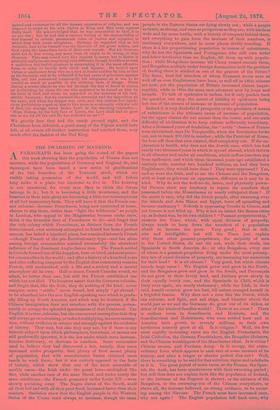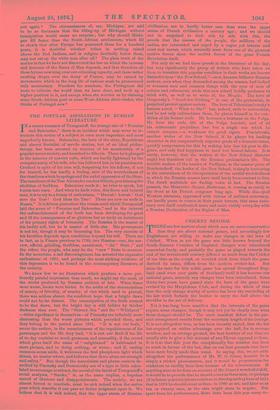THE SWARMING OF MANKIND.
APARAGRAPH has been going the round of the papers this week showing that the population of France does not increase, while the populations of Germany and England do, and thereupon have been based a new series of glorifications of the two branches of the Teutonic stock, which are visibly taking possession of the world, and will before long make it a place too tiresome to live in. The boasting is not unnatural, for every race likes to think the future belongs to it ; but it is becoming a little wearisome, and the boasters in their vain-glory are becoming a little too contemptuous of all but momentary facts. They will have it that the French can- not colonise—because Frenchmen, being now contented at home, choose to stay there, rather than "fight the wilderness" as people in London, who appeal to the Magistrates because cocks crow, think it the bounden duty of Frenchmen to do—and forget that the only colony which Frenchmen, as distinct from the French Government, ever seriously attempted to found has been a perfect success, has lasted a hundred years, has remained intensely French —though French of the pre-Revolutionary type—and has alone among foreign communities resisted successfully the absorbent influence of the dominant Anglo-Saxon raee. The French settled in Canada formed one of the happiest, best-ordered; and mostpeace- ful communities in the world ; and after a history of a hundred years and after suffering conquest by the English that community remains French, still unabsorbed, with a life and a society and a mental atmosphere all its own. Half-a-dozen French Canadas would, we admit, be better than one, but still the French established one which has not died. The boasters assert that the Germans colonise, and forget that, like the Irish, they do nothing of the kind; never conquer, never "settle," never found, but simply "go abroad," to be absorbed into the new English-speaking race which is gradu- ally filling up North America, and which may be destined, if the Chinese immigration does not interfere with the process, perma- nently to occupy the splendid spaciousness of that Continent. The English, it is true, colonise, but the concurrent assumption that they will always go on colonising, or indeed multiplying, is a mere assump- tion, without evidence in science and strongly against the evidence of history. They may, but also they may not, for if there is any historic subject upon which philosophers, historians, or sevens are still profoundly ignorant, it is the law under which races increase, become stationary, or decrease in numbers. Some economists used to believe they had discovered a law, namely, that races increased under prosperity, that plenty of food meant plenty of population, that with manufactures States obtained more hands to work them ; but it was entirely opposed to the facts of history, which show that one of the most miserable of earthly races—the Irish under the penal laws—multiplied like flies, while another race of the same blood, and under nearly the same conditions—the French peasantry under Louis XV.—were showly perishing away. The Negro slaves of the South, amid all their toil and with all their poor food, increased faster than their masters. Statistics show that the English people in the Western States of the Union tend always to increase, though the same people in the Eastern States are dying slowly out ; while a people as brave, as strong, and once as prosperous as they are, with lands as wide and far more fertile, with a history of conquest behind them, and everything to gain from the increase of their numbers, is stationary everywhere, and in some places slowly receding. If there is a law proportioning population to means of subsistence, why do not the Spaniards and Portuguese, who still own wider and fairer territories than we English, fill them up with popula- tion; while Mongolians increase till China cannot contain them, and Bengalees multiply under foreign domination until the problem of feeding them is studied as one of the gravest of the future? The fierce, beef-fed islanders of whom Froissart wrote were as well off as ever Englishmen have been, as well off as Ohio citizens are now, yet the population of Britain increased almost imper- ceptibly, while in Ohio the same race advances now by leaps and bounds. To talk of epidemics is useless, for it only pushes back the question one step, the secret of liability to epidemics being but one of the secrets of increase or decrease of population.
Indeed it is very doubtful if prosperity or the provision of means of subsistence is the ultimate cause of increase of population, for the upper classes die out sooner than the lower, and one main difficulty of civilisation is to keep culture sufficiently hereditary. After a thousand years of feudalism, the "noble "classes of France were ascertained, says De Tocqueville, when the Revolution broke out, not to reach 200,000 in number ; while the Patriciat of Rome, the best-off class that ever existed, died completely out. If the ex- planation is health, why does not the Jewish race, which has had nearly two thousand years in which to spread abroad, which thrives in all climates and under all conditions, which suffers less than any from epidemics, and which three thousand years ago established a sanitary code, number two hundred millions, as, had they been Englishmen, they would have done ? They were oppressed? Yes, and so were the Irish, and so are the Chinese and the Bengalees, with at least as grievous an oppression, different as it may be in kind. Why do not the well-to-do, brave, and physically power- ful Parsecs show any tendency to regain the numbers they possessed before the Mussulmans so nearly extirpated them ? If the secret is race, why did the Greek people, after swarming over the islands and Asia Minor and Egypt, leave off spreading and become stationary ? Nobody is oppressing Greeks in Greece, and yet Greece is not filled up. Why is not an island like Samos eaten up, as Ireland was, by its own children? "Peasant-proprietorship," answers the Times, which, with -equal division of property, always tends to keep down the numbers of a population afraid to become too poor. Very good ; that is defi- nite and intelligible ; but will the Times just explain why those other peasant-proprietors, the majority of men in the United States, do not die out, while their rivals, the Spaniards in South America do ; or why Bengalees, every one of whom is a peasant-proprietor living under the most peremp- tory law of equal division of property, are becoming too numerous for their land? It is all climate? Very good, but which climate breeds large races ? We English grow and grow in the North, and the Bengalees grow and grow in the South, and Provencals do not grow in their lovely land, and Italians grow slowly in their equally lovely one, and the Spaniards in Chili, which is Italy over again, are nearly stationary ; while the Irish, in their cold, humid country, grew too fast, till nature avenged herself in a frightful famine. Why does not a race like the Dutch, which can colonise, and fight, and sail ships, and blunder about the world just as we and the Germans do, grow out of its dykes, as either of the kindred families would? There is no room ? There is endless room in Scandinavia and Holstein, and the Scandinavians and Holsteiners, who once settled here and in America have grown to seventy millions, in their own territories scarcely grow at all. Is it religion? Well, the five most rapidly increasing races are the English Protestants, the Irish Catholics, the German Freethinkers, the Bengalee idolaters, and the Chinese worshippers of the Manchester ideas. Is it virtue ? Chinese swarm, and Puritans decay. Is it energy, the extra- ordinary force which appears in each race at some moment of its history, and after a longer or shorter period dies out? Well, there is something to be said for that solution, vague and indefinite as it is. The great period of some races, as the Roman, the Span- ish, the Arab, has been synchronous with their swarming period ; but still that does not explain facts like the population of Ireland, or the increase of the Negroes in slavery, or the advance of the Bengalees, or the swarming-out of the Chinese everywhere, or above all, the increase believed, on strong evidence, to be occur- ing among the Slavons. The French must have increased once, why not again ? The English population fell back once, why
not again ? The circumstances of, say, Michigan, are said to be so fortunate that the filling-up of Michigan without immigration would cause no surprise ; but why should Michi- gan fill faster than the South-African settlements, which fill so slowly that after Europe has possessed them for a hundred years, it is doubtful whether tribes in nothing raised above the Red Indians, and in religion decidedly below them, may not eat up the white man after all? The plain truth of the matter is that we have not discovered the law on which the increase and decrease of the Races of Man depends, and that therefore all these hymns now sung over our colonising capacity, and these rather exulting dirges over the decay of France, may be caused by movements which in the long life of nations must be pronounced only momentary. Numbers for numbers, the Portuguese did more to colonise the world than we have done, and took up a higher position in it, and except when she worries us by claiming some South-African port or some West-African slave-trader, who thinks of Portugal now?



































 Previous page
Previous page